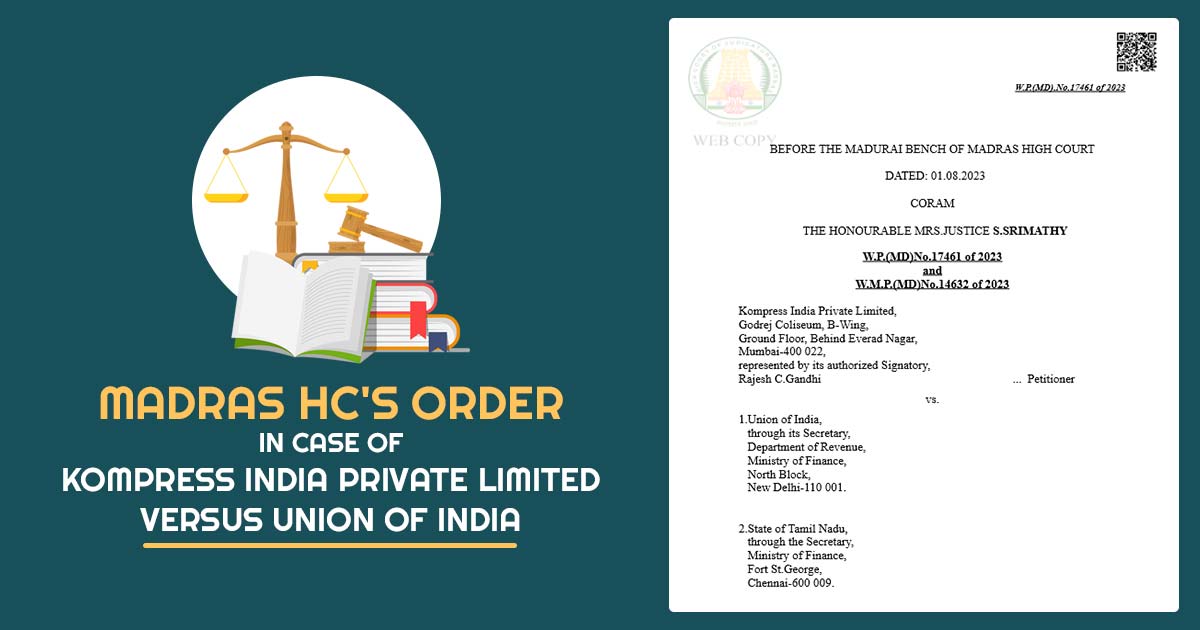
While quashing the detention order the Madurai Bench of Madras High Court ruled that if an invoice, bill of supply, delivery challan, or bill of entry and a valid e-way bill in physical or electronic form for verification are available, then no action may be initiated.
It was remarked by the bench of Justice S.Srimathy that the respondent department issued the notice carried the inspection on the identical day and passed the order on the identical day. Under the mentioned provisions the respondent’s department would required to allot the time for 7 days to answer. A clear breach of principles of natural justice was there as the inception, notice, and orders were passed on the same day.
The applicant is a private limited company that is in the manufacturing and trading of compactors and is enrolled under GST. The applicant has supplied a compactor to HDFC Limited. The goods were shipped. The goods were transported to Navi Mumbai from the premises of the applicant with a GST E-way Bill.
The vehicle was intercepted by the departure at Kodai Road. The driver produced the invoice along with the E-way bill for verification, but the department ordered physical verification of conveyance and goods in Form Mov-02 for verification. A detention order u/s 129(1) of the GST Act in Form GST MOV-06, on July 3, 2023, was issued for the reason the address found on the ‘Bill To’ and ‘Shipped To’ addresses was encountered unregistered after the verification process has accomplished.
The department mentioned that before passing the final order they would attempt to contact the supplier in Mumbai and the receiver blame each other for the fault that has been undertaken both are ready to shoulder the obligation but both are not ready to pay the penalty therefore the driver has received a notice and order who was not educated effectively no one attempted to contact the department as the applicant has not answered, the respondents has passed the order therefore the applicant could not complain that there is a breach of the principles of natural justice.
Read Also: Penalty U/S 129 of GST Act Can’t Be Imposed If Truck Moving Slowly Due to Technical Fault
It was argued by the department that under Rule 1 when the place of delivery of the receiver was not enrolled, it is not obligated to tax. U/s 2(85) the place of business comprises a warehouse, godown, or any other place of the store. The applicant furnished that they do not breach Rules 138 to 138E, which relate to e-waybills, and Rule 46, that are pertinent to the tax invoices.
Despite no breach is there under the additional provisions the applicant breached rule 11, therefore section 129 was violated. The breach is not so major if these sorts of transactions are permitted, then the assessee would opt for the same as an instance and would take the liberty to send the goods anywhere in India without effective registration.
Confusion will be there in keeping the accounts and hence it will make the way for the leakage of the revenue for the government. Therefore the department prayed to dismiss the writ petition.
It was argued by the applicant that the order was passed without jurisdiction. As the supplier wished to enrol under GST, being a supplier the applicant has enrolled shows the GST number furnished an e-way bill and the vehicle, etc. It is not mentioned in Section 25 of the GST Act that the buyer must be registered and declare the place of the registration, etc. However, the department depended on Rule 1 of the GST Rules, 2017.
It was ruled by the court that the invoice/bill of supply/delivery challan/bill of entry and a valid e-way bill in physical or electronic form for verification were available with the driver, hence the action should not have been started by the department.
It was ruled by the court that the department was not within the ambit of the law. Hence the department has misunderstood the act and passed the order, which is accountable to be quashed.
| Case Title | Kompress India Private Limited Versus Union of India |
| Case No.: | W.P.(MD) No 17461 of 2023 |
| For Petitioner | Mr Bharat Raichandani |
| For R1 | Mr.K.Govindarajan |
| For R2 & 3 | Mr R.Suresh Kumar |
| Madras High Court | Read Order |